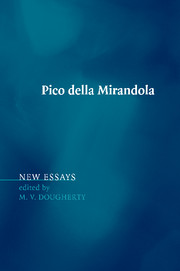Book contents
- Frontmatter
- Contents
- List of Contributors
- Pico della Mirandola
- 1 Introduction
- 2 Pico on the Relationship of Rhetoric and Philosophy
- 3 Pico, Theology, and the Church
- 4 Pico della Mirandola's Philosophy of Religion
- 5 The Birth Day of Venus: Pico as Platonic Exegete in the Commento and the Heptaplus
- 6 Three Precursors to Pico della Mirandola's Roman Disputation and the Question of Human Nature in the Oratio
- 7 Pico on Magic and Astrology
- 8 Pico's Quest for All Knowledge
- 9 A Life in Works
- Index
6 - Three Precursors to Pico della Mirandola's Roman Disputation and the Question of Human Nature in the Oratio
Published online by Cambridge University Press: 08 February 2010
- Frontmatter
- Contents
- List of Contributors
- Pico della Mirandola
- 1 Introduction
- 2 Pico on the Relationship of Rhetoric and Philosophy
- 3 Pico, Theology, and the Church
- 4 Pico della Mirandola's Philosophy of Religion
- 5 The Birth Day of Venus: Pico as Platonic Exegete in the Commento and the Heptaplus
- 6 Three Precursors to Pico della Mirandola's Roman Disputation and the Question of Human Nature in the Oratio
- 7 Pico on Magic and Astrology
- 8 Pico's Quest for All Knowledge
- 9 A Life in Works
- Index
Summary
One may be tempted to regard Pico's grand proposal for a public defense of his collection of 900 theses as an unprecedented episode in the history of intellectual endeavors. At twenty-three years of age, the young philosopher envisioned himself at the center of an elaborate disputation to be held in Rome in early 1487 before an audience comprising the pope, the College of Cardinals, and scholars brought at his expense from major centers of learning. According to some accounts, Pico is nothing less than an unprecedented sui generis Renaissance prodigy who thought his Roman disputation would uniquely herald the Second Coming. One commentator references such interpretations by asking, “Did Pico believe that his Vatican debate would end with the Four Horsemen of the Apocalypse crashing through the Roman skies …? It is impossible to know for sure.” Nevertheless, it is still possible to locate Pico's ambitious proposal within three traditions that render the event more conventional than one might initially suspect. Without denying that some elements of novelty surrounded Pico's Roman proposal, I would like to suggest that the event was intended to imitate three well-established academic models: the medieval university tradition of the quaestiones disputatae, the tradition of collecting and commenting on sententiae, and the practice of Aristotelian-style dialectical interpretation. Having shown that Pico's proposal should be viewed as a distinctive Renaissance continuation of these three academic exercises, I shall argue that a failure to recognize these traditions has led at times to an exaggerated view of Pico's project and aims and, more seriously, to some unusual renderings of his philosophical positions, especially his views on human nature.
- Type
- Chapter
- Information
- Pico della MirandolaNew Essays, pp. 114 - 151Publisher: Cambridge University PressPrint publication year: 2007



